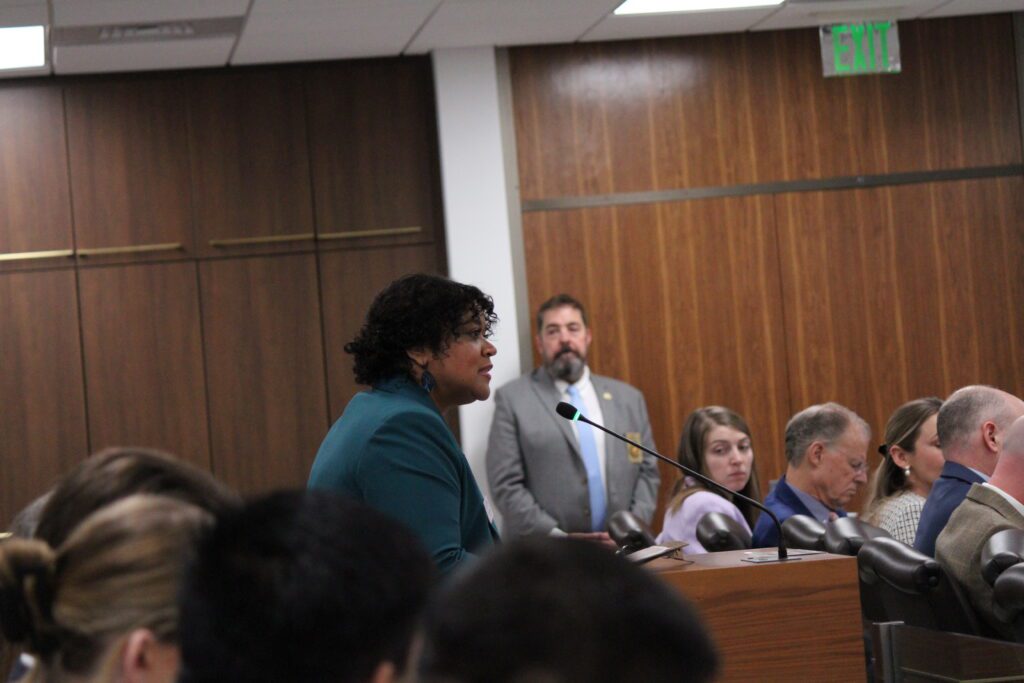The budget process is playing out in towns, counties, and school districts across North Carolina. Meanwhile, the state House and state Senate have both released their proposed budgets for the coming biennium, and lawmakers in Washington are negotiating the coming year’s federal spending.
Democracy involves maintenance. Sometimes maintenance means picking up trash in your local community or volunteering in the wake of a deadly storm. Sometimes it means seeking postsecondary education, teaching the next generation, donating money, or just being ready to act in a time of need.
Maintenance also means staying informed and making an informed vote in elections. And apart from elections, or before you’ve reached voting age, it can also mean advocating for causes and policies you believe in.
A large part of advocacy is making your voice heard — to family, peers, neighbors, and, of course, government representatives. Representatives do just that: represent you, along with their other constituents.
Whether in person, by phone, or by mail, many policymakers are more accessible than you might think. Below, you can find resources compiled by EdNC to help you get in touch with your lawmakers.
Find your representatives
The first step in contacting your representatives is knowing who they are.
Some nonprofits create online tools, like Common Cause’s Find Your Representative webpage, which allows you to enter your home address and see a list of your representatives from the federal level down to the local level.
You can also use the North Carolina voter registration lookup page to see what jurisdictions you’re registered in, including congressional district, state House and Senate districts, court districts, and more.
If you aren’t registered to vote, you can register here.
Different governmental bodies also have their own representative lookup tools. With the U.S. Congress lookup tool you can find your U.S. Representative and U.S. Senators. The North Carolina General Assembly lookup will show your N.C. state representative and state senator, and also gives you options to search by county and district.
School districts
Browse EdNC’s map of school districts, which shows each district’s superintendent and provides links to each district’s website and school board website.
You may also want to use EdNC’s map of community colleges.
Other officials of note
There’s no rule that says you can only contact officials that represent you directly. Depending on your comment or request, you may want to contact chamber leadership, committee leaders, or members sponsoring the legislation you are interested in.
See U.S. House leadership and U.S. Senate leadership.
See North Carolina State House leadership and State Senate leadership.
See a list of General Assembly committees.
More about state government and advocacy
Contact your representatives
Once you have identified your district representatives, your best bet is to visit their website to find their phone number, email address, mailing address, or online contact submission form.
Also consider contacting your mayor, your town council or board, your local board of education members, and your county commissioner.
Use the links below to contact representatives that represent all North Carolinians.
Contact President Donald Trump.
Contact Sen. Thom Tillis or Sen. Ted Budd.
Contact Gov. Josh Stein, Lt. Gov. Rachel Hunt, or elected members of the Council of State:
You can also find all the contact information (email and phone number) for state representatives and state senators on the General Assembly’s website. If you click on the hyperlink for each member, you can also find information on how to contact the lawmaker’s legislative assistant.

Attend a public meeting
Another way to have your voice heard by elected officials is to attend public meetings, whether it’s a parent event at your child’s school or in the Legislative Building in Raleigh.
Many meetings allow members of the public to sign up to speak. If there isn’t an opportunity to speak, sometimes mere presence is effective at communicating that you care about an issue up for discussion.
Some examples of public meetings are State Health Plan Board meetings, State Board of Education meetings, or State Board of Community Colleges meetings. Most public boards include information on their websites with how to sign up for public comment, and the deadline you must sign up by to speak.
The General Assembly
The North Carolina General Assembly is currently in session. Most committee meetings and floor sessions are open to the public. Check the legislative calendar for up-to-date information on the time and location of meetings, including which bills are set to be discussed.
Generally, it’s good practice to arrive early to events expected to be busy, as there are a limited number of public seats.
Read more here for everything you need to know about the General Assembly and the state government.
What to say
Keep in mind that the person who answers the phone, or the first person to read your email, will probably be a staffer.
When communicating your opinions to government officials, it’s best to be clear, concise, and respectful. If possible, mention the specific name of the bill you are referring to (e.g. “House Bill 550”) or any other relevant information.
Some advocacy organizations provide scripts you can copy and customize before sending to or calling your representative, but it might help to add a personal message of your own.
If you want a response, provide your phone number, email address, and physical address in your communication. Providing your physical address may also allow your representative to verify that you are their constituent.





